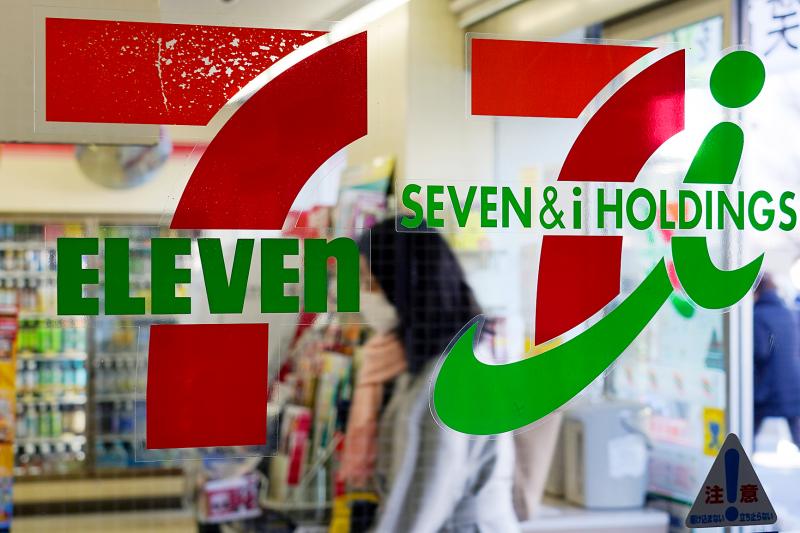Seven & i Holdings Co’s China-based convenience store business was fined for identifying Taiwan as an independent country on its Web site, the latest crackdown by China against companies over its stance on disputed territories.
Seven & i operates the 7-Eleven chain of convenience stores.
Fines of about 150,000 yuan (US$23,530) were imposed by the Beijing local authority against Seven & i, a spokesman for the Japanese retailer said, confirming an earlier report in the Nikkei newspaper.

Photo: Bloomberg
Enterprises operating in China — from Gap Inc and Daimler AG, to airlines including United Continental Holdings Inc and ANA Holdings Inc — have apologized or changed their Web sites after depicting Taiwan as a separate state. The companies usually comply, accepting it as part of the cost of doing business in China.
Seven & i “is taking the issue seriously and making sure to prevent a recurrence,” the company’s spokesman said.
Beijing’s municipal authorities last month issued the fine and a warning, a government-linked credit information Web site showed. Seven & i also failed to use Chinese names for some South China Sea islands as well as for the disputed Diaoyu Islands (釣魚島), known as the Senkaku Islands in Japan, and which are also claimed by Taiwan.
The map contained alleged errors in labeling some borders along the Xinjiang Uyghur Autonomous Region and Tibet Autonomous Region, the online report said.
While Hong Kong and Macau are special administrative regions with greater autonomy, Beijing also objects to references indicating that they are independent.

RUN IT BACK: A succesful first project working with hyperscalers to design chips encouraged MediaTek to start a second project, aiming to hit stride in 2028 MediaTek Inc (聯發科), the world’s biggest smartphone chip supplier, yesterday said it is engaging a second hyperscaler to help design artificial intelligence (AI) accelerators used in data centers following a similar project expected to generate revenue streams soon. The first AI accelerator project is to bring in US$1 billion revenue next year and several billion US dollars more in 2027, MediaTek chief executive officer Rick Tsai (蔡力行) told a virtual investor conference yesterday. The second AI accelerator project is expected to contribute to revenue beginning in 2028, Tsai said. MediaTek yesterday raised its revenue forecast for the global AI accelerator used

TEMPORARY TRUCE: China has made concessions to ease rare earth trade controls, among others, while Washington holds fire on a 100% tariff on all Chinese goods China is effectively suspending implementation of additional export controls on rare earth metals and terminating investigations targeting US companies in the semiconductor supply chain, the White House announced. The White House on Saturday issued a fact sheet outlining some details of the trade pact agreed to earlier in the week by US President Donald Trump and Chinese President Xi Jinping (習近平) that aimed to ease tensions between the world’s two largest economies. Under the deal, China is to issue general licenses valid for exports of rare earths, gallium, germanium, antimony and graphite “for the benefit of US end users and their suppliers

Dutch chipmaker Nexperia BV’s China unit yesterday said that it had established sufficient inventories of finished goods and works-in-progress, and that its supply chain remained secure and stable after its parent halted wafer supplies. The Dutch company suspended supplies of wafers to its Chinese assembly plant a week ago, calling it “a direct consequence of the local management’s recent failure to comply with the agreed contractual payment terms,” Reuters reported on Friday last week. Its China unit called Nexperia’s suspension “unilateral” and “extremely irresponsible,” adding that the Dutch parent’s claim about contractual payment was “misleading and highly deceptive,” according to a statement

Artificial intelligence (AI) giant Nvidia Corp’s most advanced chips would be reserved for US companies and kept out of China and other countries, US President Donald Trump said. During an interview that aired on Sunday on CBS’ 60 Minutes program and in comments to reporters aboard Air Force One, Trump said only US customers should have access to the top-end Blackwell chips offered by Nvidia, the world’s most valuable company by market capitalization. “The most advanced, we will not let anybody have them other than the United States,” he told CBS, echoing remarks made earlier to reporters as he returned to Washington